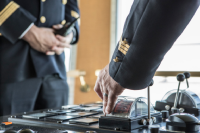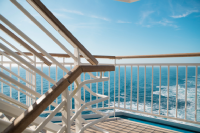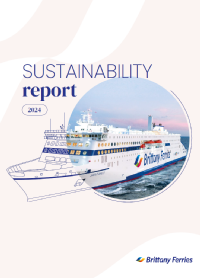ENERGY TRANSITION
Fleet renewal
Deeply committed to respecting the environment in which it operates, Brittany Ferries has been working for several years towards an eco-responsible future. The success of its energy transition is a pillar of its five-year recovery plan.
In five years, five next-generation ships have joined the fleet. Galicia and Salamanca entered service between 2020 and 2021, followed by Santoña in 2023. The latter two are powered by liquefied natural gas (LNG).
In 2025, Saint-Malo and Guillaume de Normandie — hybrid LNG/electric vessels — completed this evolution, demonstrating Brittany Ferries’ commitment to performance, innovation, and ecological transition.
Galicia
Galicia was the first ship in the fleet to embody the Company’s ambition to showcase westerly European holiday destinations.
It serves customers two weekly rotations between Portsmouth and Santander in northern Spain, as well as one weekly crossing between Cherbourg and Portsmouth. Departure and arrival times, as well as crossing durations, have been designed to allow passengers to discover their holiday destination from the moment they board, through art, Spanish cuisine, and a warm holiday atmosphere, all while enjoying a pleasant sea voyage in harmony with the environment.
The latest technologies are at the heart of Galicia’s design. Its hull design and hydrodynamic qualities ensure excellent seaworthiness and outstanding energy performance. Optimised onboard power generation and exhaust gas scrubbers significantly reduce atmospheric emissions.
Salamanca and Santoña
Salamanca goes even further in energy efficiency and emissions reduction. It is among the first ferries of its kind to run on LNG*, offering major environmental benefits compared to traditional marine fuels. Its exhaust emissions are sulphur-free, virtually particle-free, and reduce nitrogen oxide by 95%. It was joined by Santoña in 2023.
These new ships, each weighing 42,200 gross tons and measuring 215 metres in length, are the largest in the Brittany Ferries fleet, providing 3,000 linear meters for freight. Through fleet renewal, Brittany Ferries reinforces its commitment to energy transition, offering passengers a more efficient, eco-friendly, and comfortable vessel for their journey.
The future : liquiefied natural gas (LNG)
Liquefied natural gas offers significant environmental advantages over traditional fuels. It enables more efficient combustion, free of sulphur and virtually particle-free, while reducing nitrogen oxide emissions by 85% and CO₂ emissions by 20%.
A 46% reduction in CO2 emissions per passenger
Major investments in fleet renewal were decided before the COVID-19 health crisis. The first two LNG-powered ships, Salamanca and Santoña, have a significant impact on reducing carbon emissions per passenger on routes linking the UK and Spain. The Company reduced rotations from five to four per week between UK and Spain, resulting in a substantial reduction in fuel consumption and emissions. Combined with improved energy efficiency and the use of LNG* as fuel, a 46% reduction in CO₂ per passenger is achieved compared to ships previously operating on the same routes.
*Liquefied Natural Gas
Saint-Malo and Guillaume de Normandie
These two ships, named after the regions they represent — Brittany and Normandy — perfectly reflect Brittany Ferries’ commitment to combining performance, innovation, and environmental respect. Thanks to hybrid propulsion combining LNG and electricity, these vessels mark a new step toward significant emission reductions. They embody the future of sustainable navigation.
From LNG to electric: a choice for the future
They feature the largest installed electric capacity of any vessel of this type to date, enabling optimal energy propulsion while minimising their ecological footprint. This energy storage capability transforms the ships’ energy consumption, offering maximum flexibility and efficiency.
Award-winning innovation
Saint-Malo was named “Ferry Ropax of the Year” at the Ferry Shipping Summit held in Malmö, Sweden, on November 13, 2025. This distinction highlights the positive momentum initiated by the Company and recognizes maritime excellence at the European level, rewarding the commitment to a new generation of sustainable maritime transport combining performance, responsibility, and environmental respect.
Brittany Ferries confirms successful biofuel trials
The next major step in Brittany Ferries’ environmental voyage is replacing fossil fuels with fuels derived from biomass. In 2024, Brittany Ferries conducted its first tests with liquefied biomethane, a fuel with an almost zero carbon footprint. Synthetic fuels produced from renewable hydrogen could complement decarbonised energy sources in the future.
Shore power: toward zero emissions
This new stage will allow Saint-Malo and Guillaume de Normandie to connect to the electric grid while docked. The scale of this connection is of particular interest to Brittany Ferries because, beyond a “simple” shore connection, it also enables onboard battery recharging, opening the possibility of using hybrid vessels — and even fully electric ones — during port manoeuvres, as ports gradually adopt electrification. Portsmouth will be the first Channel ferry port equipped with shore power, followed by Saint-Malo in 2027 as part of port infrastructure upgrades. When hybrid ships can connect on both sides of the Channel and operate in 100% electric mode, they will emit no greenhouse gases or pollutants while docked.
Our People
Brittany Ferries - the story of many hundreds of passionate staff members enjoying fulfilling careers


